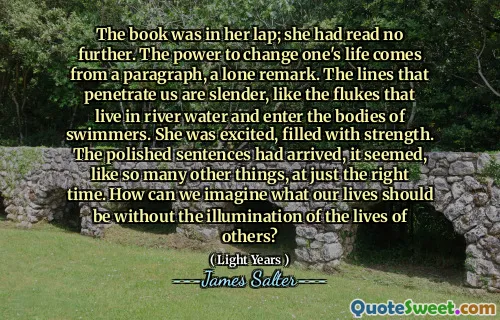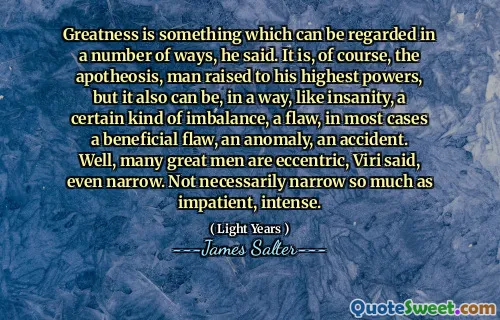
Greatness is something which can be regarded in a number of ways, he said. It is, of course, the apotheosis, man raised to his highest powers, but it also can be, in a way, like insanity, a certain kind of imbalance, a flaw, in most cases a beneficial flaw, an anomaly, an accident. Well, many great men are eccentric, Viri said, even narrow. Not necessarily narrow so much as impatient, intense.
This quote presents a nuanced perspective on the nature of greatness, emphasizing that it is not a monolithic trait but rather a multifaceted phenomenon. The analogy comparing greatness to both the apotheosis—the divine elevation or perfection of man—and to insanity or imbalance highlights how society often perceives extraordinary individuals. Innovation, brilliance, and genius frequently stem from traits deemed eccentric or peculiar by societal standards. These so-called flaws, such as impatience or intensity, can be catalysts for extraordinary achievements. The acknowledgment that many great men are eccentric or even narrow suggests that their unconventional qualities might be both a source of strength and perceived deficiency, yet they contribute to their uniqueness and potential for greatness. The idea that such traits are often beneficial flaws aligns with the concept that what is viewed as a flaw in one context can be an asset in another, especially when it propels individuals beyond common limitations. This reflects an appreciation for the complexity of human nature and the importance of embracing the unconventional aspects of personality as integral to greatness. It challenges us to rethink how we judge success and the qualities we value. Seeing greatness as a blend of imbalance and brilliance underscores the importance of nurturing individuality and understanding that exceptional achievements often arise from a delicate balance of qualities that may seem at odds but together forge extraordinary paths.







